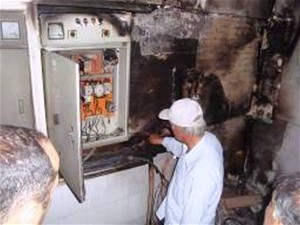
A worker replaces the electrical system of the Mazar Water Utility’s central pump station.
USAID/CAWSA
USAID helps the Afghan water utility provide service for 50,000 people.
23 SEPTEMBER 2010 | MAZARI SHARIF, AFGHANISTAN
The Mazar Strategic Business Unit (MSBU) of the Afghan Urban Water Supply and Sewerage Company is the third largest water system in Afghanistan. Its 65 operational wells pump a combined 8,500 cubic meters of water per day to serve 18,000 connections, providing water to more than 327,000 people. With a broad cross-section of customers – including individuals, religious sites, government buildings, schools, factories, and commercial businesses – any disruption in service affects many people.
However, because of poor electrical service and serious voltage fluctuations in the power lines, pump failures are more frequent than they should be. Repairs can be time-consuming, as critical parts are often unavailable in the department warehouse.
The electrical system for one of the larger pump stations in the middle of Mazar-i Sharif recently burned out, cutting off service to a population of more than 50,000. Many of the affected customers were preparing to protest this loss of service at a public demonstration in front of the Governor’s House.
MSBU Director Eng. Abdul Jamil Maseh reached out to USAID for urgent assistance. USAID’s Commercialization of Afghanistan Water and Sanitation Activity (CAWSA) program immediately recognized the importance of quickly restoring service and provided replacement parts and equipment to MSBU.
Reduced service was temporarily restored until the permanent repair was completed. Thanks to USAID’s prompt assistance and MSBU’s commitment to water service delivery, the repair restored full service to all affected customers.
To help reduce the probability of future service interruptions, CAWSA installed new voltage regulators and engaged the local power utility to provide training in electrical system repair and preventive maintenance. CAWSA is now preparing a plan to install electrical protection equipment and to improve inventory planning and program budgeting to enhance warehouse stock levels.
Eng. Jamil, expressing his appreciation to USAID, saying, “This small investment by USAID and the quick response of the CAWSA team has made a large impact on MSBU operations.”







Comment
Make a general inquiry or suggest an improvement.